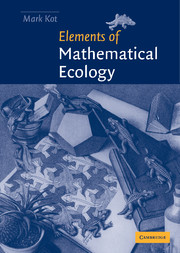Summary
Ecology is an old discipline. The discipline was christened in 1866 by Ernst Haeckel, a well-known German evolutionary biologist. Haeckel was a neologist - he loved to invent new scientific terms. His most famous gems are phylogeny and oecologie. Oecologie and ecology take their derivation from the Greek oikos, house or dwelling place. Ecology, as envisioned by Haeckel, is the study of the houses and the housekeeping functions of plants and animals. It is the scientific study of the interrelationships of organisms, with each other, and with their physical environment. The idea of ecology is even older (Worster, 1994). It is closely related to 18th century notions of the balance or economy of nature reflected, most clearly, in Linnaeus's 1749 essay Oeconomia Naturae (Stauffer, 1960).
Ecology is also a diverse discipline. After all, it has all of life to account for. In the old days, it was common to divide ecology into two subdisciplines: autecology, the ecology of individual organisms and of populations, and synecology, the study of plant and animal communities. Ecology is now divided into many subdisciplines.
Several subdisciplines use mathematics. For example, behavioral ecology makes extensive use of game theory and of other brands of optimization. It is impossible to cover all of these subdisciplines in one short book. Instead, I focus on population ecology and engage in occasional forays into community ecology and evolutionary ecology. This book could, and perhaps should, have been entitled The Dynamics of Biological Populations.
- Type
- Chapter
- Information
- Elements of Mathematical Ecology , pp. vii - viiiPublisher: Cambridge University PressPrint publication year: 2001



